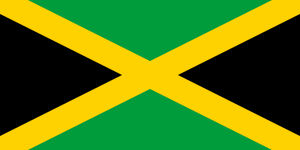Religion in Jamaica
According to the most recent census (2001), religious affiliation in Jamaica consists of 64% Christian (62% Protestant and 2% Roman Catholic), 2% Jehovah's Witnesses, 3% unstated, and 10% other.[1] The category other includes 29,026 Rastafarians, an estimated 5,000 Muslims, 3,000 Buddhists 1,453 Hindus, approximately 350 Jews and the census reported 21% who claimed no religious affiliation.[1]
Christian
Protestantism
62% of the Jamaican population are Protestants. Jamaican Protestantism are composed of several denominations: 24% Church of God, 11% Seventh-day Adventist, 10% Pentecostal, 7% Baptist, 4% Anglican, 2% United Church, 2% Methodist, 1% Moravian and 1% Brethren.
The Church of God has 111 congregations in 6 regions:[2]
- Western: 10 congregations in the parishes of St. James, St. Elizabeth, Westmoreland and TrelawnyAlso, there is the National Roman Catholic Institute of God.
- South Central: 27 congregations in the parishes of Manchester and St. Elizabeth
- North Central: 17 congregations in the parishes of St. Ann, Manchester and Clarendon
- Central: 21 congregations in the parishes of St. Catherine, Manchester and Clarendon
- South Eastern: 19 congregations in the parishes of St. Andrew, Kingston and St. Catherine
- North Eastern: 17 congregations in the parishes of Portland, St. Mary and St. Ann
Roman Catholicism in Jamaica
There are about 50,000 (2%) Catholics in Jamaica, which is divided into three dioceses, including one archdiocese:
- Roman Catholic Archdiocese of Kingston in Jamaica
- Roman Catholic Diocese of Mandeville
- Roman Catholic Diocese of Montego Bay
The Missionaries of the Poor monastic order originated in Kingston, Jamaica.
Rastafari movement
The Rastafari movement or Rasta is a new religious movement that arose in the 1930s in Jamaica, which at the time was a country with a predominantly Christian culture where 98% of the people were the black descendants of slaves.[3][4] Its adherents worship Haile Selassie I, Emperor of Ethiopia (ruled 1930–1974), as God incarnate, the Second Advent.
Other religions
Other popular religions in Jamaica include Islam, Bahá'í Faith with perhaps 8000 Bahá'ís[5] and 21 Local Spiritual Assemblies,[6] Buddhism, Sikhism and Hinduism.[7] There is also a small population of around 200 Jews forming the Shaare Shalom Synagogue in Kingston, who describe themselves as Liberal-Conservative.[8] The first Jews in Jamaica trace their roots back to early 15th century Spain and Portugal.[9] Islam in Jamaica estimate a total Muslim population of 5,000.[10]
Religious freedom
Jamaica's constitution provides for freedom of religion, laws and policies contribute to the generally free practice of religion.[1] The law at all levels protects this right in full against abuse, either by governmental or private actors. The Government generally respects religious freedom in practice.[1] In 2008, the U.S. government learned of no reports of societal abuses or discrimination based on religious affiliation, belief, or practice.[1]
References
- ↑ 1.0 1.1 1.2 1.3 1.4 International Religious Freedom Report 2008: Jamaica. U.S. Department of State (2008)
 This article incorporates text from this source, which is in the public domain.
This article incorporates text from this source, which is in the public domain. - ↑ http://churchofgodinjamaica.org/app/webroot/files/Churches_Location_List_Region_Sequence(1).pdf
- ↑ "Rastafari, roots and Ideology". OneWorld Magazine. Retrieved 2010-02-01.
- ↑ ""Dread Jesus": A New View of the Rastafari Movement". Cesnur.org. Retrieved 2010-02-01.
- ↑ "Map Source: www.worldmap.org". Online. 2007.
|chapter=ignored (help) - ↑ Bahá'í International Community (2006-08-11). "Jamaicans celebrate 4th National Baha'i Day". Bahá'í World News Service.
- ↑ religiousintelligence.co.uk, religiousfreedom.lib.virginia.edu
- ↑ Haruth Communications, Harry Leichter. "Jamaican Jews". Haruth.com. Retrieved 2009-07-04.
- ↑ Dawes, Mark (2003-06-10). publisher=Gleaner Co. "Jews hold firm Life goes on in Old Synagogue". Retrieved 2007-12-15.
- ↑ "Jamaica". State.gov. 2007-09-14. Retrieved 2009-07-04.
| ||||||||||||||
| |||||||||||||||||||||||||||||||||||||||||
| |||||||||||||||||

.svg.png)